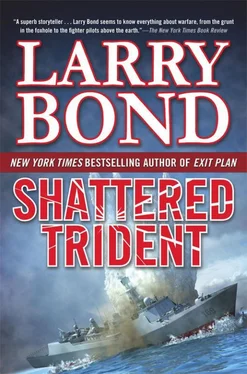Hisagi and Orihara both looked grim. The minister replied respectfully, but firmly. “Your arguments, and more, were debated at length, and the decision was made by our national leaders, as is their duty.
“This is at least in part because of your work, sensei . As long as we were willing to let America guarantee our security, Japan could limit her armed forces. If we are to stand by ourselves now, as part of a military alliance, then we should build whatever we need for a proper defense.”
“Please, let me speak to the prime minister,” Komamura pleaded.
“What will you do, question his heritage as well?” Orihara responded harshly. “Put your skills to work and show us a way to break the Chinese economy. If we can do that quickly enough, then all of this is moot. One more opinion will not change anything. Events have moved forward. There is no looking back.”
13 September 2016
1300 Local Time
By Water
Halifax, Nova Scotia
He titled the piece “Shattered Trident.” Christine’s source, whom he’d dubbed “Deep Voice,” didn’t send something every day, but everything he sent was a blockbuster. The latest one had arrived less than three hours ago, and Christine was waiting for him to proof and polish the piece before giving it to her.
There. He always forced himself to read completely through each posting one final time before sending it. With the last few corrections made, he hit the “Send” link and checked his watch.
She’d use the text he wrote almost verbatim, now that she’d given him a few journalism tutorials, but she’d still have to assemble the “visuals.” That probably meant the 4:00 P.M. feed. He wouldn’t post the article until then. Their arrangement was simple. CNN was the source, so CNN got the scoop.
All the news channels, and probably many of the intelligence services, now watched his blog closely. He wasn’t the only source of information about the war, but he had broken enough stories now so that he was a known authority—an authority with excellent sources.
This article would only reinforce his blog’s status. Laird’s source had given them The Plan: a complete copy of the Chinese operations order for something called “Trident.” While the military details were fascinating, the underlying purpose and goal were frightening. It was bad enough that China had intended to seize most of the disputed territory in the South China Sea by force, but beyond that, those in the East China Sea, and then the Yellow Sea. China’s leaders had big ambitions.
What if the plan had succeeded? He tried to imagine the entire western Pacific under Communist Chinese hegemony. This posting would change the world’s attitude about China. It could have as much effect on China’s fortunes as a traditional bombing campaign.
He’d better proofread it again.
As Mac read, he imagined what the Chinese spokesman would say. It was certain that they’d be barraged with questions, just as the Littoral Alliance spokesman had been besieged after his last major release. A detailed analysis of China’s oil infrastructure and its impact on the economy had spiked Littoral Alliance claims of imminent victory, changing the public debate almost overnight. He imagined that was Deep Voice’s real goal, although Mac couldn’t see that the pronouncements by the two warring factions had improved. Each side just used what it wanted and ignored any inconvenient facts.
13 September 2016
1430 Local Time
Pearl Harbor-Hickam Joint Base
Hawaii
Commander Garcia, the sub base XO, met Patterson’s plane at Hickam with a private car. During the five-minute ride to the sub base, he briefed her on the security. “With the war, we were already at a very high level. The special weapons requirements are on top of that, of course, but they’re not attracting the kind of attention they would normally.”
Even as he described them, the car stopped at the gate to the part of Pearl Harbor that housed the sub base. A marine sentry examined all their identification thoroughly while a dog handler walked around the car. They even checked the trunk and searched her overnight bag.
The techs had decided to do the work at the base’s torpedo shop. While moving twelve nuclear warheads from inactive storage was not a simple process, moving twelve Mark 48 torpedoes was even harder, and there simply wasn’t room at the special weapons shop for twelve torpedoes, each nearly twenty feet long and weighing almost two tons.
There was more security at the torpedo shop itself, the building literally surrounded with marines, weapons at the ready. And was that a machine-gun position?
More salutes, and more identity checks at the door, but at least she’d left her overnight bag in the car. Inside, she was greeted by Captain Marino, the sub base commander, and Colonel Thomas, head of the technical team. “My people will supervise loading the torpedoes onto each sub, and the arming.”
“Did you have any problems with the authorization process?” she asked. She’d been briefed about the strict rules controlling what the United States called “special weapons.” There was the two-man rule, requiring that all work on a nuclear device, however trivial, be done by two people, and thoroughly documented, of course. Each weapon also had to be under positive control at all times. This meant that until it was to be launched at a target, a weapon was guarded at all times and could not be armed, which required authorization from the president.
Thomas explained, “President Myles has signed an executive order declaring that this use of nuclear weapons is not an attack on any country, but a ‘controlled detonation for peaceful purposes.’ The SECDEF has also verified the order. Each weapon will be prepped just before it’s put in the tube, in the presence of the sub’s captain, weapons officer, you, and myself.”
That was why she was there. She was the president’s personal representative. She carried the Permissive Action Link, or PAL security codes, for the nuclear warheads. This was definitely not the way things were done normally. But the submarines’ fire control system lacked the ability to insert the PAL code while at sea, so the codes would have to be manually entered just as the torpedo was loaded into the tube. Without a proper PAL code, a warhead could not be armed. It would be by her action that eight nuclear weapons would be detonated in the South and East China Seas. It didn’t seem quite real.
“Once we verify that the weapon is properly prepared, it goes in the tube and we padlock the tube door. The only way it leaves the tube is either by being fired, or offloaded when the sub returns to base. The captain and weapons officer of each sub will have access to the keys, in case of emergencies.”
“But the subs only have four torpedo tubes,” Patterson protested. “You’ll be tying up two of them until they get back to port. Can’t they wait to load them until they’re in position to fire?”
“Not and maintain positive control, ma’am. Too many people have access to the torpedo room. And we’ll be using three tubes, actually,” Thomas clarified. He ignored her alarmed expression.
“Each sub will have a third weapon as a spare, in case there’s a problem with either of the first two. So, yes, until they fire, they will only have one tube available for self-defense. But once they do shoot, they can unlock the tube doors and use them normally.”
She didn’t know whether to be relieved or more concerned. Of course, the four boats would not be looking for a fight when they sailed, but poor Santa Fe demonstrated that plans didn’t always work out.
Читать дальше

![Никки Сикс - Героиновые дневники. Год из жизни павшей рок-звезды[The Heroin Diaries - A Year in the Life of a Shattered Rock Star]](/books/78612/nikki-siks-geroinovye-dnevniki-god-iz-zhizni-pavshej-rok-zvezdy-the-heroin-diaries-a-yea-thumb.webp)










